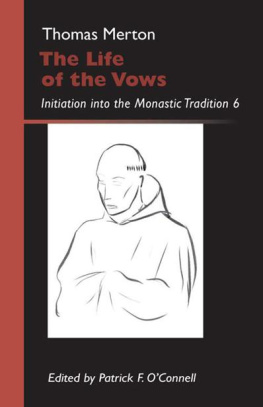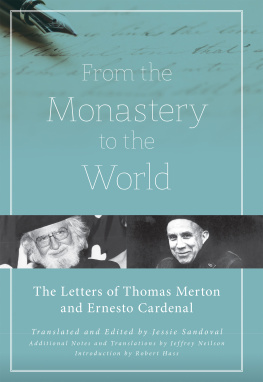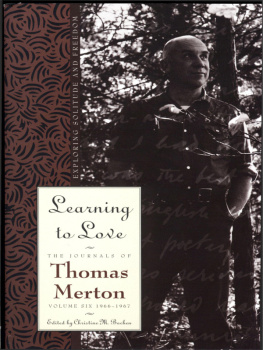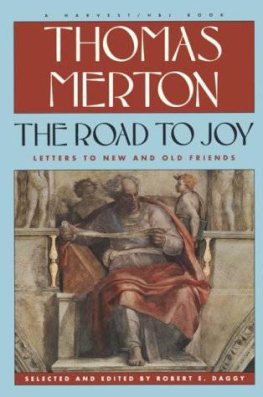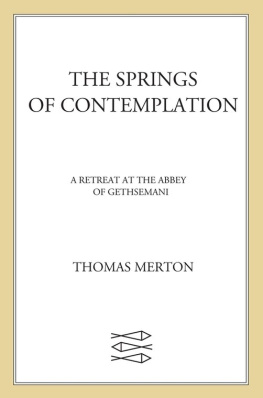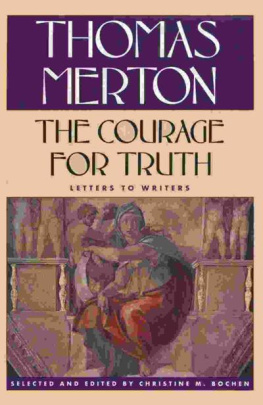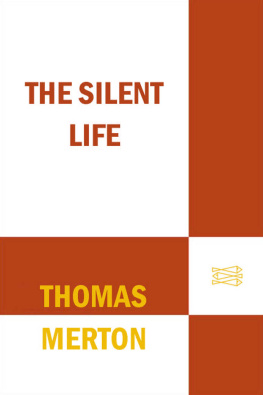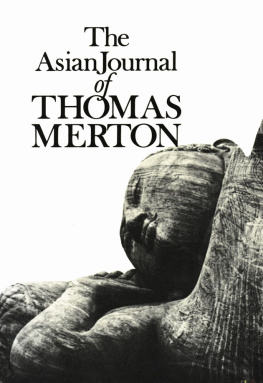The Life of the Vows is an excellent, detailed presentation of the perennial challenges of the Benedictine vows for anyone who wants to understand them better in order to live them well. A truly helpful study for one in initial formation or as a refresher course for veteran monastics.
Br. M. Anthony Weber, OCSOVocation DirectorAbbey of the Genesee
While written prior to Vatican II with an emphasis on external observances, Merton addresses his novices in a refreshingly direct way. His comments on chastity and poverty are still valuable for today and helpful for any newcomer to the life discerning lifetime commitments.
Br. Placid MorrisVocation DirectorAbbey of New Clairvaux, Vina, California
MONASTIC WISDOM SERIES
Simeon Leiva, OCSO, General Editor
Advisory Board
Michael Casey, OCSO | Terrence Kardong, OSB |
Lawrence S. Cunningham | Kathleen Norris |
Patrick Hart, OCSO | Miriam Pollard, OCSO |
Robert Heller | Bonnie Thurston |

INITIATION INTO THE MONASTIC TRADITION SERIES
BY
THOMAS MERTON
Cassian and the Fathers:
Initiation into the Monastic Tradition (MW 1)
Pre-Benedictine Monasticism:
Initiation into the Monastic Tradition 2 (MW 9)
An Introduction to Christian Mysticism:
Initiation into the Monastic Tradition 3 (MW 13)
The Rule of St. Benedict:
Initiation into the Monastic Tradition 4 (MW 19)
Monastic Observances:
Initiation into the Monastic Tradition 5 (MW 25)
MONASTIC WISDOM SERIES: NUMBER THIRTY
The Life of the Vows
Initiation into the Monastic Tradition 6
by
Thomas Merton
Edited with an Introduction by
Patrick F. OConnell
Preface by
Augustine Roberts, OCSO

Cistercian Publications
www.cistercianpublications.org
LITURGICAL PRESS:
Collegeville, Minnesota
www.litpress.org
A Cistercian Publications title published by Liturgical Press
Cistercian Publications
Editorial Offices
Abbey of Gethsemani
3642 Monks Road
Trappist, Kentucky 40051
www.cistercianpublications.org
Excerpts from Thomas Mertons Contemplation in a World of Action (New York: Doubleday, 1971). Used by permission of the Merton Legacy Trust.
Excerpts from The Confession of St. Augustine , translated by F. J. Sheed (Sheed & Ward, 1943). US rights granted by permission of Sheed & Ward, an imprint of Rowman & Littlefield Publishers, Inc. World rights granted by permission of Contiuum International Publishing Group, a Bloomsbury Company.
At time of publication, permissions were pending for the excerpts from The Rule of St. Benedict in Latin and English , edited by Justin McCann (London: Burns and Oates, 1952).
The Statement of the American Bishops on the Need for Personal Responsibility 1960 United States Conference of Catholic Bishops, Washington, DC. Used with permission. All rights reserved.
2012 by Order of Saint Benedict, Collegeville, Minnesota. All rights reserved. No part of this book may be reproduced in any form, by print, microfilm, microfiche, mechanical recording, photocopying, translation, or by any other means, known or yet unknown, for any purpose except brief quotations in reviews, without the previous written permission of Liturgical Press, Saint Johns Abbey, PO Box 7500, Collegeville, Minnesota 56321-7500. Printed in the United States of America.

Library of Congress Cataloging-in-Publication Data
Merton, Thomas, 19151968.
The life of the vows : initiation into the monastic tradition 6 / by Thomas Merton ; edited with an introduction by Patrick F. OConnell ; preface by Augustine Roberts.
p. cm. (Monastic wisdom series; no. 30)
Includes bibliographical references.
ISBN 978-0-87907-030-4ISBN 978-0-87907-793-8 (e-book)
1. Vows. 2. Monastic and religious life. 3. Benedictines. 4. Cistercians. I. OConnell, Patrick F. II. Title.
BX2435.M466 2012
255.01dc23
2012013342
TABLE OF CONTENTS
PREFACE
It seems that Father Louis, whom most of us know as Thomas Merton, had already begun to think of a plan for more adequate formation of Gethsemanis postulants, novices and simply professed, even before he was named novice master in 1955. He had been in the monastery over thirteen years by that time, the last six as a solemnly professed priest, which was plenty of time for him, with his voracious reading ability, penetrating intellect and teaching experiencenot to mention several books already writtento perceive that something was lacking in the abbeys formation program.
One of the results is this present volume on the vowed life, one of several written for young monks in formation. By 1960, when it was completed, Merton was already forty-five and had benefited from four years as master of scholastics, then five more as novice director. It is a moment in life when the creativity of youth crosses with the beginnings of acquired wisdom, and each of these sets of conferences shows such intertwining. Of the texts now published, the present one on the vows is clearly the youngest sister, slightly awkward, yet the one turning out to be the most directly pastoral work Merton ever wrote, and thus one of the most paradoxical ones. Therein lies its special interest for us.
What precisely is this special significance, and where is the paradox? They are to be found primarily in the first half of the volume, sections IIII, where he treats of man and his last end, the states of life and the vows in general. Mertons presentation here of such classic themes of Christian morality as the nature of man and his acts, the importance of justice in relation to the Passion of Christ, to friendship and to love, or self-surrender as the key to grace, prayer and the vowed lifeall these pages clearly spring from a committed heart and often flow with the soaring intensity of style that we have come to expect in his more enthusiastic prose.
It seems to me that it is the combination of these three elementsthe subjects themselves, the pastoral intensity with which they are treated, and the fact that their author is often thought of in relation to more non-classic themes of interestthat give these first 230-odd pages a certain paradoxical character and at the same time make them a significant contribution to the Merton corpus. Moreover, their interest has been considerably heightened by the work of Professor Patrick OConnell in identifying and including in the present volume not only the sources of Mertons thought, but also the English translations of many of the original texts he is referring to. Both sources and texts were generally lacking from Mertons typewritten manuscript, which had no footnotes. Generally, Merton simply indicated the authors he had consulted, such as St. John of the Cross, Pre Joseph de Guibert, SJ, the Benedictines Abbot Anscar Vonier, Olivier Rousseau, Philibert Schmitz, Cuthbert Butler and John Chapman, classic moral theologians like Gnicot, Schaefer and Goyneche, and the traditional commentaries on the Rule of St. Benedict. What will probably surprise us is his abundant, in-depth use of the Summa Theologiae of St. Thomas Aquinas. This is clearly more than just lip service. Merton shows that he has studied the Summa and assimilated its inner meaning. We are probably indebted for this to his ongoing familiarity with the works of four outstanding contemporary philosopher-theologians, all of them Catholic laymen: tienne Gilson, Jacques Maritain, Dietrich von Hildebrand and Josef Pieper. However, Mertons vigorous expos of traditional themes of moral theology, with the applications he makes to the contemporary situation inside and outside the monastery, gives every indication of being the fruit of personal reflection and sincere conviction.
Next page
